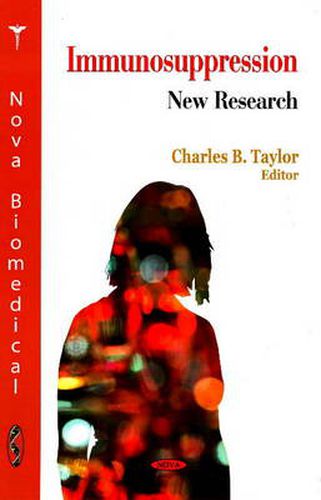Readings Newsletter
Become a Readings Member to make your shopping experience even easier.
Sign in or sign up for free!
You’re not far away from qualifying for FREE standard shipping within Australia
You’ve qualified for FREE standard shipping within Australia
The cart is loading…






Immunosuppression involves an act that reduces the activation or efficacy of the immune system. Some portions of the immune system itself have immuno-suppressive effects on other parts of the immune system, and immunosuppression may occur as an adverse reaction to treatment of other conditions. Deliberately induced immunosuppression is generally done to prevent the body from rejecting an organ transplant, treating graft-versus-host disease after a bone marrow transplant, or for the treatment of auto-immune diseases such as rheumatoid arthritis or Crohn’s disease. This is typically done using drugs, but may involve surgery (splenectomy), plasmapharesis, or radiation. A person who is undergoing immunosuppression, or whose immune system is weak for other reasons (for example, chemotherapy and HIV patients) is said to be immunocompromised. When an organ is transplanted, the immune system of the recipient will most likely recognise it as foreign tissue and attack it. The destruction of the organ will, if untreated, end in the death of the recipient. In the past, radiation therapy was used to decrease the strength of the immune system, but now immunosuppressant drugs are used to inhibit the reaction of the immune system. The downside is that with such a deactivated immune system, the body is very vulnerable to opportunistic infections, even those usually considered harmless. Also, prolonged use of immunosuppressants increases the risk of cancer. This book presents the latest research in the field.
$9.00 standard shipping within Australia
FREE standard shipping within Australia for orders over $100.00
Express & International shipping calculated at checkout
Immunosuppression involves an act that reduces the activation or efficacy of the immune system. Some portions of the immune system itself have immuno-suppressive effects on other parts of the immune system, and immunosuppression may occur as an adverse reaction to treatment of other conditions. Deliberately induced immunosuppression is generally done to prevent the body from rejecting an organ transplant, treating graft-versus-host disease after a bone marrow transplant, or for the treatment of auto-immune diseases such as rheumatoid arthritis or Crohn’s disease. This is typically done using drugs, but may involve surgery (splenectomy), plasmapharesis, or radiation. A person who is undergoing immunosuppression, or whose immune system is weak for other reasons (for example, chemotherapy and HIV patients) is said to be immunocompromised. When an organ is transplanted, the immune system of the recipient will most likely recognise it as foreign tissue and attack it. The destruction of the organ will, if untreated, end in the death of the recipient. In the past, radiation therapy was used to decrease the strength of the immune system, but now immunosuppressant drugs are used to inhibit the reaction of the immune system. The downside is that with such a deactivated immune system, the body is very vulnerable to opportunistic infections, even those usually considered harmless. Also, prolonged use of immunosuppressants increases the risk of cancer. This book presents the latest research in the field.